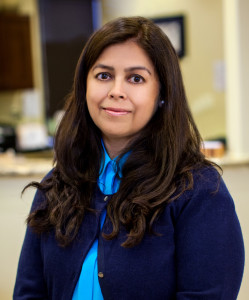Tina Hawkins was working full time and looking forward to an early retirement in four years at the age of 61.
Happily married to Mark, her husband of 37 years, she believed her three grandchildren were a blessing and could not be more grateful for the support of two loving daughters. In essence, she was living the good life. This all changed one day while walking with her grandchildren at the Phoenix Zoo.
“The squeezing sensation in my right shoulder came suddenly and barely lasted for a few seconds, so I dismissed it as a cramp,” Tina said. The squeeze returned while in line waiting for the train. “I had an explanation for it,” she said. “My youngest grandchild, Aaron, had just pulled my hand, and I thought that was the reason for the squeeze.”
In the next several months, the right shoulder squeezing sensation would return periodically, both at rest and upon exertion. “Surprisingly, each time, I had an explanation for it,” Tina admitted. “I would say to myself, ‘I slept the wrong way, I carried the heavy grocery bag, or my youngest daughter should buy a better car seat’” Tina recalled.
By this time, Tina’s husband, Mark, was getting a little concerned with her symptoms. He encouraged her to see her primary care physician. “Initially, I declined, but Mark insisted, and, as such, I had no choice but to set up an appointment with my doctor,” Tina admitted. “My doctor did an EKG and reassured me that these are muscle twinges and I am OK.”
However, the right shoulder squeeze was recurrent. “By now, it was waking me up at night,” Tina said. “One night, the right shoulder squeeze sensation occurred twice and lasted a bit longer. This prompted Mark and me to report to the emergency room. The emergency room doctor also did an EKG and tested my blood looking for enzymes present when someone is having a heart attack. All tests came out negative and normal. I was, again, sent home reassured.”
Little did Tina know these emergency room visits at night would became quite frequent, but would not yield any results except false reassurances. During one of these visits, the emergency room physician actually became angry and frustrated and told Tina heart pain does not occur in the right shoulder, and she should stop worrying about it.
“The persistent nature of the squeezing sensation in my right shoulder and lack of answers or solutions by my doctors prompted me to seek a cardiologist,” Tina said. “My cardiologist took a complete history and performed an EKG and stress test. Although, I passed the stress test, my symptoms persisted. My cardiologist did not give up. She recommended some additional tests. I eventually was diagnosed with very tiny and narrow wire-like tubes supplying oxygen to my heart.”
Tina’s cardiologist explained to her how the oxygen being supplied to her heart by these small tubes is both inadequate and sub-optimal and thereby causing her pain.
“Finally, I had a name and term for my sufferings. I had Microvascular Coronary Artery Disease,” Tina said. “My cardiologist explained I would benefit from long-term use of medications and lifestyle changes.”
Just like women differ from men in several ways, including thinking, behavior, response to alcohol, etc., women also have different presentations of heart attack. The dramatic sign of clutching the chest is often lacking. Women may have symptoms of anxiety, palpitations, jaw pain, neck pain, shoulder blade pain, arm pain or shoulder pain like Tina. Sometimes, there is no pain but only shortness of breath or unexplained sweating or fatigue.
Also, just because the discomfort or sensation is not in the left chest it does not preclude or eliminate the heart as a cause of symptoms. With that in mind, as a cardiologist, it is recommended patients like Tina avoid ignoring symptoms. Instead, openly discuss concerns with your doctor, who may be able to risk stratify you in terms of your heart. So, keep listening to your heart.
Happy Holidays!
The above article is based on actual conversations between Dr. Ahmad and her patient. The name and age have been changed to keep the patient’s identity confidential.
A multiple board certified cardiologist, Dr. Afroze Ahmad is a cardiologist who cares and listens.
For information, or to make an appointment, please call (480) 361-9949. Las Sendas Cardiology is located at 3514 N. Power Road, Suite 107.


